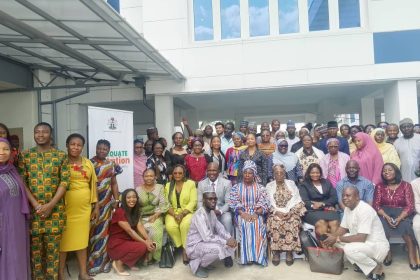
The United Nations Children’s Fund said Nigeria ranks first in Africa and second worldwide in the number of malnourished children.
The Chief of Nutrition for UNICEF Nigeria, Nemat Hajeebhoy, said this on Monday at the ongoing three-day collaborative meeting between the Federal Ministry of Health and Social Welfare, the National Primary Healthcare Development Agency, and the state nutrition managers.
Hajeebhoy said, “When we look at Nigeria, we see that in Nigeria, we have between 35 and 45 million children under five years of age. Now, when we look at children and we say they are malnourished, if they’re not doing well, we say they are malnourished, and you have different types of malnutrition. You have about 12 million children who we say are stunted, which means they are short in terms of their height for their age.
“We have about nine million children who are wasted, which means they’re too thin for their height, and then we have about 24-25 million children who are anaemic, which means they do not have enough iron, or their blood is not healthy. So, with these numbers, Nigeria is number one in the continent and second in the world, after India. So in Nigeria, we need to all come together to address this issue, because if we address the issue in Nigeria, we address it for West Africa, we address it for the continent.”
She, however, said 43 million Nigerian children have received vitamin A supplements.
“During the maternal, newborn, child health week campaigns that were held in all the states of the country in May, June, July and August to deliver vitamin A supplementation, deworming tablets to children under five, iron, folic acid or multiple micronutrient supplements to pregnant women, I’m delighted to share that 43 million children receive vitamin A supplements this time. This is the first time in Nigeria we have had such a high number.
“We also see that all 36 states unlocked resources to get deworming tablets given to children. And 19 million children were reached with deworming tablets. We also see that over two million pregnant women receive supplements of either iron and folic acid or a multiple micronutrient tablet, and this is very important to enable them to be healthy and for the growth of their children.
“What I am hopeful for is that the next round of MNC week which will happen between mid-November and mid-December, that we can have the support from the states, mothers, fathers, grandparents, so that we can reach the same numbers in the second round. If we achieve this, then we will have achieved results for Nigeria, for West Africa, for the continent and the world,” she added.
Meanwhile, the Director and Head of the Nutrition Department, FMoHSW, Ladidi Bako-Aiyegbusi, noted that efforts are being made by the Federal Government to check the progress made and prioritise activities that will improve nutrition in the country.
She said, “Nigeria has the highest burden in Africa and the second highest in the world but the government is collaborating with other stakeholders to change that narrative, and we have put in place quite several strategies.
“We have the coordination team through which we interact with stakeholders every quarter to find out what everyone is doing, and the challenges. We are also ensuring that this coordination that is being strengthened at the federal level, it’s also being strengthened at the state level.”
“All stakeholders need to come together and invest in that age, because if we don’t, then we compromise the child for life,” she stated.
The Deputy Director, Nutrition, NPHCDA, Dr Ogechi Akalonu noted that there is a need for strategies for improving the nutritional status in the country.
She said, “It is a good meeting to ensure that nutrition is visible and top of the national agenda.
“So we need to come together to strategise on how best to improve the nutritional status of women and children.”
On his part, the Country Director, Nutrition International, Dr Osita Okonkwo
emphasised the need to increase funding to ensure the implementation of the Maternal, Newborn and Child Health campaigns.
Okonkwo, who was represented by the Programme Officer, Child Health and Nutrition, Junaidu Sani reiterated the organisation’s commitment to supporting the government in the implementation of the MNCH.

